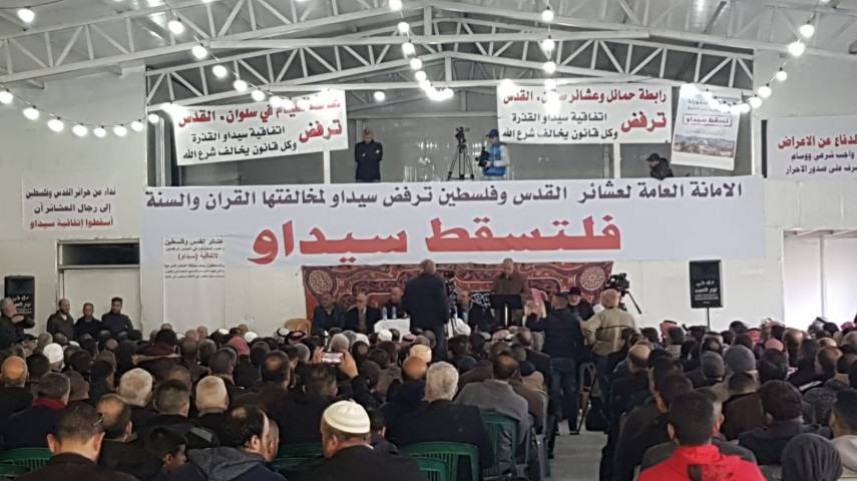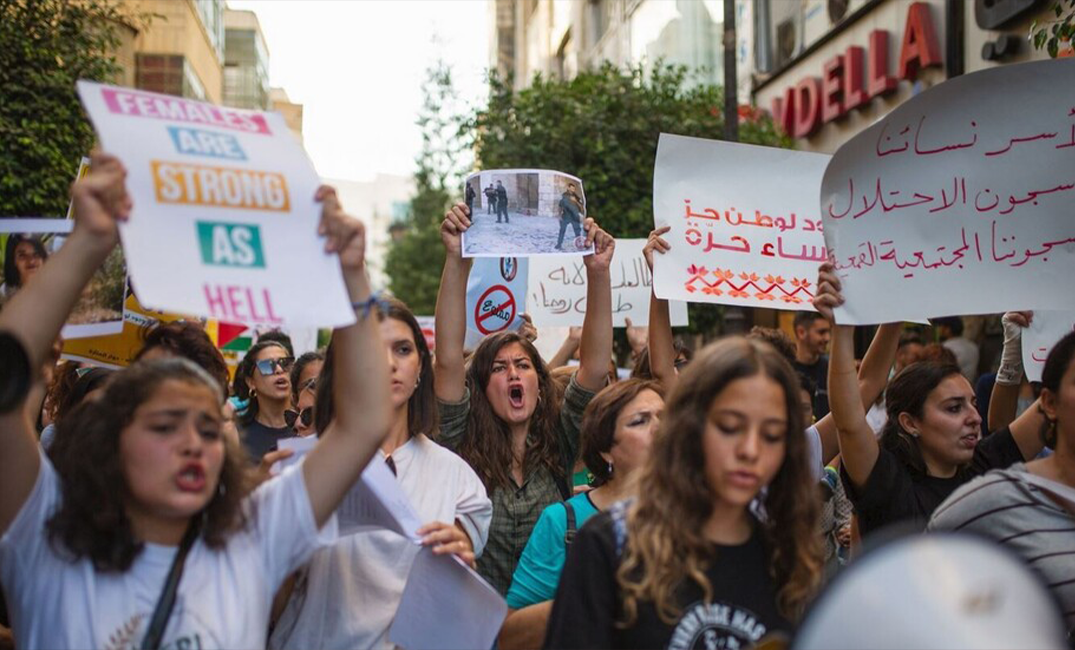This post is also available in: Français (French) العربية (Arabic)
By Mohanad Adam
The debate over CEDAW between those who oppose it and those who support it intensified for a few months on social media platforms, where several pages were created to spread misleading information to undermine and vilify the convention, subsequently becoming the forum for heated debates between the two sides, according to CEDAW’s supporters radio Nisaa spoke with.
Six years after the Palestinian feminist movement had celebrated their country’s ratification of the CEDAW without any reservations, its implementation is still on hold and feminist hopes are dashed, despite the sharp increase of murder crimes and violence against women in the year 2020.
“The religious and tribal voices opposing the implementation of the convention are still getting louder and imposing their authority over the government,” is a statement echoing the state of feminist movement, amidst fears of the convention – which President Mahmoud Abbas had signed in 2014 – being buried.
CEDAW was passed by the United Nations General Assembly in 1979 and ratified on 3 September 1989. It is signed by 189 states, including 54 states that are members of the Islamic Cooperation Organization.
At the time, President Mahmoud Abbas asked the government to reconsider the laws in force so that they are aligned with CEDAW. But until this day, no amendments have been implemented except for those relating to raising the minimum age for marriage to 18 years and allowing mothers to open bank accounts for their children.
Religious and tribal refusal and a legal controversy
Some opposition parties, such as Al-Tahrir Party, which is at the forefront of Islamist opposition, see that this delay stems from the belief that the spirit of the convention contradicts the principles of Islamic jurisprudence (sharia) in some of its articles. According to Al-Tahrir Party, CEDAW contravenes sharia by virtue of its principles of equality in inheritance between men and women; the elimination of male guardianship over women; the elimination of the period of time from which a women is prohibited from being with another man after she is separated from her husband (i’ida); women’s right to give their children their name; the elimination of polygamy; and legalizing gay marriage.
The Grand Mufti of Jerusalem and the Palestinian territories, Sheikh Mohammed Hussein, announced that “it is not possible to ratify under any circumstance any law that does not comply with the provisions of Islamic sharia that are in force in the Palestinian territories.”
He further added: “the decision of the Jurisprudence Council reaffirms that anything that contradicts with and does not go in agreement with the Islamic sharia is completely rejected whether it is CEDAW or any other agreement that does not comply with the spirit of sharia… there are personal status laws derived from the provisions of Islamic sharia, they are laws that completely align with the spirit of sharia and ensure everyone’s rights.”

Sheikh Hussein also specified that CEDAW is wide ranging and has articles that agree with most of the teachings of all religions in terms of protection of human [rights], however, what is important “are the other issues that are disagreed upon,” such as abortion, inheritance, ‘homosexuality,’ and others.
It is also worth noting that Palestine’s Supreme Judge, Mahmoud Al-Habash, previously stated that “Islamic sharia is above the law, and above any political commitment or commitment to international laws and conventions,” and that “we will not accept any contradiction with what God has prescribed.”
Some tribes in Hebron, Jerusalem and Gaza also expressed their refusal of the convention by organizing protests urging the government not to implement it. Subsequently, the Palestinian Constitutional Court issued a decision in 2018 stating that “anything in the agreement that contradicts with the national identity does not have to be implemented.” The Palestinian Bar Association also rejected without any reservation the implementation and publication of CEDAW in its current form.
Feminist movements insist on CEDAW despite fierce opposition, the state is the foundation
Feminist movements are still holding on to the convention and are asking the government and the president to implement it. To this end, feminist groups continue to organize campaigns calling for its implementation, especially in light of the epidemic of violence against women in the Palestinian territories and the lack of parity in the job opportunities afforded to men and women and women’s suffering from discriminatory practices in all fields.
Under this context, member of the General Union of Palestinian Women Secretariat, Rima Nazzal, underlined the importance of implementing the convention, which aims to eradicate all forms of discrimination between men and women, reinforce the concept of equality and support to Palestinian women’s political and social rights, in addition to upholding the state’s sovereignty.
She also said in reply to the opposing voices to the convention that CEDAW “is put on hold under false justifications that it contravenes Islamic sharia and contradicts society’s values, despite the fact that the Palestinian basic law stipulates equality between all citizens and gives women their full rights. Therefore, we do not see that this delay is justified or [that the convention] contradicts with the orientation of the state of Palestine and its basic laws.”
“The reasons behind this rejection are an outcome of Palestinian society being influenced by its Arab environment, where many extremist and fundamentalist Salafi movements have emerged, as we have witnessed the escalation of radical violence in the region, and Palestine has not been isolated from being influenced by this reality,” added Nazzal.
Finally, Nazzal said that “the [Palestinian] authority sadly did not work on confronting these segments that have limited freedoms, threatened human rights defenders and accused them of betrayal. The policy of silence towards this behavior allowed for the growth of this current in society.”































